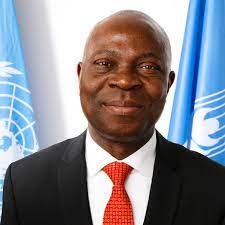The Director-General of the International Labour Organization (ILO), Gilbert F. Houngbo, has called for more assistance to debt-distressed developing countries to enable them to continue funding social protection and decent work programmes.
Houngbo, in statements delivered at the World Bank/International Monetary Fund (IMF) meeting holding in Marrakech, Morocco, told the World Bank Development Committee that more needed to be done to address developing countries’ limited financial resources by pursuing additional debt restructuring and relief and global financial system reform.
He noted that in low and middle-income countries the international labour organization did not foresee rapid improvements in employment before 2025.
The Director-General said: “The fiscal position of low-income countries requires particular attention as the tightening of monetary policies in advanced economies is severely impacting their external balances and increasing their debt vulnerabilities.
“This, combined with surges in food and energy prices, considerably narrows the scope for governments’ spending in sustainable investments and in social protection”, Houngbo added.
Citing a July 2023 UN report which found that 3.3 billion people currently lived in countries that spend more on servicing debt than on education or health to justify his position, he cautioned that “to prevent debt burdens further impeding sustainable development, the role of investments in human and productive capacities must be better factored into debt sustainability assessments and in debt resolution mechanisms.
“This would not only support countries in their transition but also help (re)create the conditions for macroeconomic stability and economic transformation over time”, he added.
The Director-General told delegates that the United Global Accelerator on Jobs and Social Protection for Just Transitions, which was launched in September 2021 by the UN Secretary-General, António Guterres, offered a three-step solution to these issues: creating national strategies and policies for employment and social protection that facilitate fair transitions; combining domestic and international funding; and enhancing international cooperation.
Houngbo further clarified: “Multilateral, bilateral and National Public Development Banks and the IMF can support the Global Accelerator by contributing to the national roadmaps in pathfinder countries that aim to define national priority entry points and sustainable financing strategies (…) they can set more ambitious social impact targets to incentivize more projects that will contribute to the objectives of the Global Accelerator.”
In his written statements to the International Monetary and Financial Committee of the IMF and Development Committee of the World Bank, the Director-General noted that under-investment in social protection remained one of the main reasons for low levels of coverage.
According to him, “there are multiple options to create and extend fiscal space for social protection. The key sources of financing, however, need to be domestic regular sources such as progressive taxes and social contributions, given that the commitments of social protection systems and floors are long-term ones.
“It is critical that countries develop programmes to formalize employment, enterprises and economic transactions, as well as the institutions required to collect taxes and social contributions”, the ILO chief added.
Houngbo also emphasized that a decisive response to climate change demanded coherent approaches and comprehensive policy frameworks, including in the private sector.
He expatiated: “Climate action, if properly managed, can lead to more and better jobs. Both adaptation and mitigation offer opportunities to create new jobs and businesses, while securing existing ones.
“We can expect the creation of many millions of additional jobs in the coming years and decades, provided that education and skill-building programmes are appropriately expanded, workforce development programmes are put in place, and labour market measures are refined in line with evolving needs”, the Director-General added.






